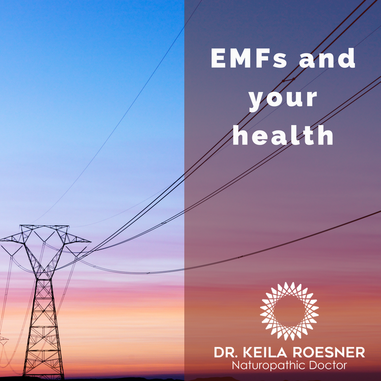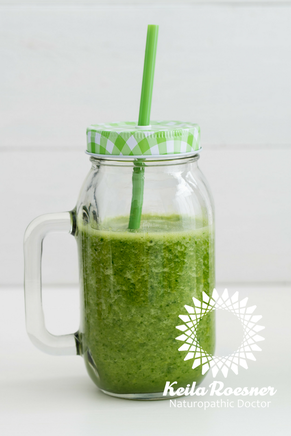 You’re careful about your health. You do your best to eat well, and you pay attention to the ways that your diet affects your energy levels....but something seems off. You’re experiencing annoying symptoms that you can’t explain. You’re often gassy and bloated, your skin may not be clear and glowing anymore, you may be ready for a nap after a meal and you wish you could remember where you put your keys. Why does your memory feel so foggy? These issues are frustrating (and often embarrassing) and they’re also very common. Many patients that come to see me are already living a fairly healthy lifestyle, but are baffled by continuing digestive issues, mysterious rashes, and low energy levels. If this sounds familiar, it may be time to take a good look at your diet. Even a “healthy” food can make you sick if your body is sensitive to it, even if you're eaten it your whole life without issues until now. For many, the food mystery becomes both frustrating and overwhelming when trying to understand what foods are nourishing you and not making you feel terrible. The good news is that you may not have to look very far to make changes that relieve your symptoms. With a bit of detective work, and a bit of help, you can map out a dietary plan that restores your well being. What are the Symptoms of Food Sensitivity? Food sensitivities can be tricky to diagnose. Symptoms can vary widely from person to person and can even be different depending on what else is happening in your body. For example, you might respond differently at different stages of your menstrual cycle, or if you’ve been under more stress or not sleeping as well. Food sensitivities can cause or contribute to:
Another reason why a food sensitivity is often a missed diagnosis is that these symptoms can be delayed up to 72 hours after a meal, so many people don’t make the connection between what they ate and how they feel. Even the most incredibly observant people can find it difficult to notice that they feel brain fog 3 days after eating a “normal” food. Similarly, it’s difficult to measure how many people suffer from food sensitivities because a lot of us don’t seek medical help, figuring that it’s “normal” to feel gassy and tired all of the time. In fact, conventional medical practitioners can be skeptical about food sensitivity symptoms, which can lead to frustration for patients. But it doesn’t have to be this way. What Causes Food Sensitivities? It’s important to recognize the difference between food allergies, food intolerances, and food sensitivities. Food allergies are immune reactions. After eating a certain food, your body’s immune system launches an attack by making its own protein, called immunoglobulin E (IgE). The next time you consume that food, your body is ready to attack again. The IgE causes your body to release a chemical called histamine, which triggers the physical symptoms of an allergic reaction. This is the type of allergy reaction one has to pollens and dander. With food, it can cause frightening anaphylaxis reactions. A food intolerance occurs when the body loses the ability to produce a certain digestive enzyme. Lactose intolerance occurs when the body cannot produce the lactase enzyme, and fructose intolerance occurs when a body cannot produce the fructase enzyme. Eating foods with lactose or fructose will then cause gas/bloating and diarrhea to occur (and can be a sign of Small Intestinal Bacterial Overgrowth).. A food sensitivity reaction occurs when you eat a food and it forms an antigen/antibody reaction. That is, a different part of your immune system binds to the food, the IgG reaction. Those immune complexes can cause intestinal and systemic problems in the body and mind. There are specialty labs that can detect this reaction. In our practice, we use Alletess Labs to identify these reactions.... and one blood draw can uncover up to 184 food sensitivity reactions! If we continue to eat that food sensitivity, the lining of the gut can become inflamed and damaged. Eventually, it can become permeable, so the undigested material “leaks” into the bloodstream. Not surprisingly, this is called “leaky gut” syndrome or intestinal hyperpermeability. What is the root cause of food sensitivities? And why are they becoming increasingly common? There are many medical reasons:
Which Foods Can Cause Food Sensitivities? Uncovering food sensitivities is a fantastic reason for seeing a Naturopathic Doctor – we have the tools to help identify if a particular food is making you sick. In addition, medical supervision can ensure your approach to food remains healthy and balanced. Research suggests that food sensitivities can be a trigger for disordered eating in some people. After all, if food is causing you pain, but you’re not sure which foods are to blame, it’s easy to associate your diet with negative experiences. How Can You Treat Food Sensitivities? At our office, we identify and address foods sensitivities with this approach:
Sometimes food sensitivities are only the tip of the iceberg and we have to go deeper and look to other causes of your symptoms. You can read more about that here. Uncovering food sensitivities is a truly a game-changer for many of our patients. If you suspect that something is off, I would love to offer you a complimentary Health Discovery session to see if our approach is right for you. Sources:
3 Comments
 Estrogen – it’s not a dirty word. Estrogen plays an important role through the course of our reproductive lives and beyond. It regulates our menstrual cycle, strengthens our bones, controls our cholesterol, and much more. When our estrogen levels go “out of tune” we experience PMS or menopausal symptoms. But even before menopause, varying levels of this vital hormone can wreak havoc. That’s because estrogen requires a delicate balance with other hormones. When that balance is disturbed, we can experience a wide range of frustrating symptoms. This hormonal imbalance often occurs during a particularly busy time of our lives, the period from about age 25 through to menopause. As a result, our practice sees many women who are dealing with unexplained weight gain, mood swings, and libido problems. But there is help available. A few simple steps can help you restore balanced estrogen levels and feel like yourself again. How Do You Know if You Have Estrogen Dominance? Estrogen dominance can impact many areas of our lives, with symptoms that range from subtle shifts to major disruptions in wellbeing. Many women in this age group assume these issues are a normal part of aging or a consequence of their busy schedules. Just because it is common, does NOT make it a healthy normal! Even a slight imbalance in hormone levels can lead to a number of problems. Symptoms can vary greatly by person, but often include:
Does that list look familiar? I see many women in my practice each month with complaints like these. I totally understand how frustrating they can be, especially when you’re unable to find effective treatment. And, of course, the complex relationship between estrogen and our emotions can only magnify the frustration. Who wants to feel irritated about feeling irritable? It’s not only women who can experience estrogen dominance. You may be surprised to know that men can suffer an excess of estrogen as well. In men, estrogen dominance can manifest a bit differently, with some of these symptoms being common:
What Causes Estrogen Dominance? To understand estrogen dominance, we have to consider the role of another important hormone, progesterone. Progesterone and estrogen maintain an often tricky seesaw in our bodies. Prior to menopause, the balance shifts at different stages of the menstrual cycle. Estrogen dominance isn’t necessarily a surge of estrogen, but an imbalance in that seesaw. Simply put, estrogen dominance happens when the seesaw tips to one side because there is not enough progesterone to balance out the estrogen. There’s actually no “set” number we can measure that proves an estrogen dominance diagnosis. It’s the overall hormonal profile that is important – the DUTCH test is an extremely valuable tool that I use regularly for assessing this balance. How does estrogen become dominant? A key factor is the timing. Or, to be more specific, the time of our lives. Consider a normal menstrual cycle during our reproductive years: After we ovulate mid-cycle, our bodies produce progesterone to balance out estrogen. But as we near menopause, we often have some menstrual cycles when we do not ovulate. As a result, there is not enough progesterone to balance out the estrogen. Enter estrogen dominance -- and its long list of possible symptoms. To a certain extent, estrogen dominance is a natural part of our aging process. However, recent years have seen a rise in estrogen-dominance complaints, and our busy lifestyle may be a big factor. Environmental and behavior issues can increase estrogen levels, tipping the seesaw even further. What’s to blame? Take a look at this list.
How Can You Restore Hormone Levels? Our practice can work with you to re-balance your hormonal havoc. Starting with an accurate diagnosis, we can create a lifestyle plan that works for you. As a starting point, these changes are recommended:
Do the estrogen dominance symptoms sound a bit too familiar? Please contact our clinic and we’ll get to the bottom of what’s going on and create a plan of action to bring your body back to good health. References  Understanding the effects of Electromagnetic Radiation (EMF) and Radiofrequency Radiation (RF) on Your Health Our health is directly affected by a variety of things we cannot see but know to be true. We don’t see the air, but we are sensitive to air quality on a smoggy day. We cannot see UV rays, but we can certainly feel their effects while baking at the beach. Gravity is also not visible but if you're clumsy like me, you'll be very familiar with its effects as well (I was famous in high school for not only falling down but also up stairs... it happened a lot). And while we cannot see electromagnetic radiation (EMF), a growing number of people are reporting symptoms that directly correlate to electrical hypersensitivity (EHS) and radiofrequency radiation (RF). Over the last 20 years, physicians with the American Academy of Environmental Medicine have been seeing patients whose symptoms appeared to be triggered by “dirty electricity” – which is when high frequencies travel along electric wires between the power source and electric grid. This includes power lines, televisions, computers, and other electrical devices. Those suffering from EHS might experience varying symptoms including headaches, dizziness, chronic fatigue, depression, memory loss and confusion. Now, more than ever, we are living in a world of convenient luxuries that depend heavily on electrical pollutants. We have phones in our pockets, microwaves in our homes, and satellite systems in our cars. As science attempts to keep up with our technology leaps and bounds, we are only beginning to comprehend the effects RF waves have on our health. What is Radiofrequency Radiation? The electromagnetic wave spectrum is composed of two parts: ionizing radiation and nonionizing radiation. Ionization radiation includes X-rays and ultraviolet rays, whereas non-ionizing radiation includes radiofrequency (RF). For years we have focused on the negative impact of ionizing radiation, but now we are starting to understand the impact of non-ionizing radiation or radiofrequency. RF is what allows you to borrow your neighbour’s WiFi while you’re waiting for the service guy to come (thank you university roommates!). Without the need for wires, RF has the power to pass through walls and go just about anywhere it pleases – and that includes inside our body. In this digital age, almost anything we can imagine can be a source of radiofrequency radiation. Our cell phones might seem obvious, but what about our Smart Meters, our children’s gaming systems, the baby monitor? They all use wireless communication, surrounding us in a constant invisible fog of over-stimulation and electrosmog. Our society encourages us to keep up or fall behind. Have you ever passed the Apple store the day a new iPhone hits the market? So many of us are willing to stand in lengthy lines, just to be early adopters of the latest technology. We prioritize and depend on technology to make our lives better. And no doubt, it does. However, most of us never consider how our addiction to technology also impacts our health by inundating our bodies with a constant barrage of radio frequencies. How Can EMF & RF Affect Your Health? While EMF and RF radiation is considered "biologically safe" according to safety data provided by Health Canada and other organizations, the reality is that the level of our constant low-grade exposure is not reflected in their guidelines. Some scientists have been researching the impacts of electrosmog on our bodies long before our world became so highly digitized. In 1987, one study proved that exposure to electrosmog at levels considerably lower than those observed in urban areas created changes in human brain waves and behaviour. EMF may also affect the mitochondria -- our cellular energy factories, which are fundamental to every energy-dependent process in our body, most notably our nervous system. As a result, EMF-induced disruption of our mitochondria may effectively bolster neurodegenerative diseases like Alzheimer’s and Parkinson’s, as well as playing a part in other diseases and health issues where mitochondrial dysfunction is implicated. These include psychiatric disorders, autoimmune diseases, headaches and migraines, chronic fatigue syndrome, fibromyalgia, stroke, diabetes, heart disease, reproductive disorders, cancers… the list goes on and on! If EMF and RF are already having an impact our lives, what are the long-term effects for our children raised in a world choked by electrosmog? Only time will tell. Minimize Your EMF & RF Exposure While more data is required, we already know that there are larger health ripple effects associated with our beloved devices. You can start reducing your exposure to EMFs by:
By simply spending time in nature and grounding yourself so you have direct contact with the earth, you are opening the gateway for an influx of electrons to be absorbed and distributed throughout your body. This transfer of electrons can help to neutralize oxidative stress and minimize any derangements in the electrical activities of your body. Put down the damn phone and open the door to a healthier future! I want to help you take control of your health! If you believe you have symptoms that could be related to electrical hypersensitivity, please book a free Health Discovery Session to find out more. In health, Dr. Keila Roesner BHSc ND References:
 Time outside in nature, especially in the forest or by water, can help reduce your EMF exposure Time outside in nature, especially in the forest or by water, can help reduce your EMF exposure  Your body is ALWAYS trying to communicate with you. The problem is that most of us get so busy that we forget how to listen… so our body needs to scream to get us to pay attention. I hear it all the time. “But Dr. Keila, I’m pretty healthy..”! Meanwhile, you may be taking a few prescription medications to control your blood pressure, thyroid and that random rash that comes and goes. TUMS are in your medicine cabinet and you carry Tylenol in your purse all the time. But that’s all normal, right? Nope. Not at all. There is a BIG difference between common and normal. Common is taking a few prescription medications, having digestive issues and bad knees. Normal is having a good night’s rest, waking with energy and not requiring caffeine. Normal is being able to eat food without feeling awful afterwards, and almost never getting heartburn or headaches. Big difference. Sometimes our body needs a reset. To clear the clutter and figure out what actually is going on. Here are 10 major signs your body is not functioning “normally” (even though they may be common!).
A good detox should help you address all of these things. It is not meant to “fix” things, but to help your body reset and tune out some of the noise so that you can actually figure out what the heck is going on. Do any of these sound like you? Comment below! If you are tired of these common, but definitely NOT normal signs, here’s three free you can do:
If you found this article interesting please share. In health,
 Every spring and fall, I get clients asking me about doing some kind of “I need to cleanse but not the kind where you run to the bathroom all the time” because they are feeling the effects of over-eating and over-scheduling. I always get a chuckle out of that. It’s hard to spend any time online without coming across some celebrity’s secret weight loss plan or miracle 48 hour juice program to drop 3 dress sizes before the weekend. Most of it is crap. After enough time spent reading headlines in the grocery store line, it’s easy to think that doing one of these is either essential or something to be avoided at all times because we saw a news thing on it once and it didn’t work. Never any in between. But what if you are not feeling so great, want to re-set but don’t want to get caught up in hype or do something dangerous? It’s crucial to know the difference. A cleanse usually describes a short term program where foods are restricted and fluids are encouraged. For example, there is the Master Cleanse which involves fasting apart from lemon juice, maple syrup and cayenne. It also involves diarrhea. Other versions might include only fresh-pressed juices or water or broth. The general idea is to give your digestive system a break to flush out the digestive system. We target the large intestine in particular so there is often a focus on having bowel movements. Lots of them. A detox program typically focuses on helping the body to process things more efficiently while putting less garbage in. This might include staying away from problematic-at-times foods like wheat, dairy, alcohol and caffeine while increasing healthier foods like greens, fresh lemons and lean proteins. Herbal supplements are often used in addition to help the body get things going. This typically will involve helping the liver, kidneys, intestines, lungs and skin to work more efficiently. There is often a focus on resting, and gentle exercise. So which one is better? It depends on what you’re looking for! As a Naturopathic Doctor, I tend to be pretty wary of cleanses, particularly if they are not supervised medically. That being said, there is some pretty good evidence out for therapeutic fasting with some conditions. Juices can equal a lot of sugar and may actually stress the liver and contribute to blood sugar issues. And again, diarrhea isn’t fun. Detoxes are not all created equal either. "Detox herbs", and products picked up off health food store shelves can be helpful for some people and make others feel awful. I often think this is due mainly to not eating crap food for a period of time. Sometimes herbs can be a big help but again, this totally depends on your health, any medications you are taking and how stressed out you are. I am generally in favor of giving the body a break periodically by eating well, resting and moving. The specifics are highly dependent on your goals. In my next blog, we will talk about how to start with a good detox and when you should do one. If you are looking to re-set and would like a program tailored to YOU, let's talk. In health, |
Top 75 Naturopath Blogs & Websites For Naturopathic DoctorsAuthorDr. Keila Roesner is a Naturopathic Doctor. When not treating patients she is also an enthusiastic barefoot-strolling, music-loving, yoga-doing kitchen wiz - who also happens to be a wrestling fan. Categories
All
|
Let us take you from hormonal to whole.
|
Dr. Keila Roesner, BHSc ND
Naturopathic Doctor, Hormone Warrior and Your Wellness Cheerleader 247 Church Street, Stratford ON N5A 2R7 (519) 273-0900 drkeila@roesnerwellnesssolutions.com |
|









 RSS Feed
RSS Feed